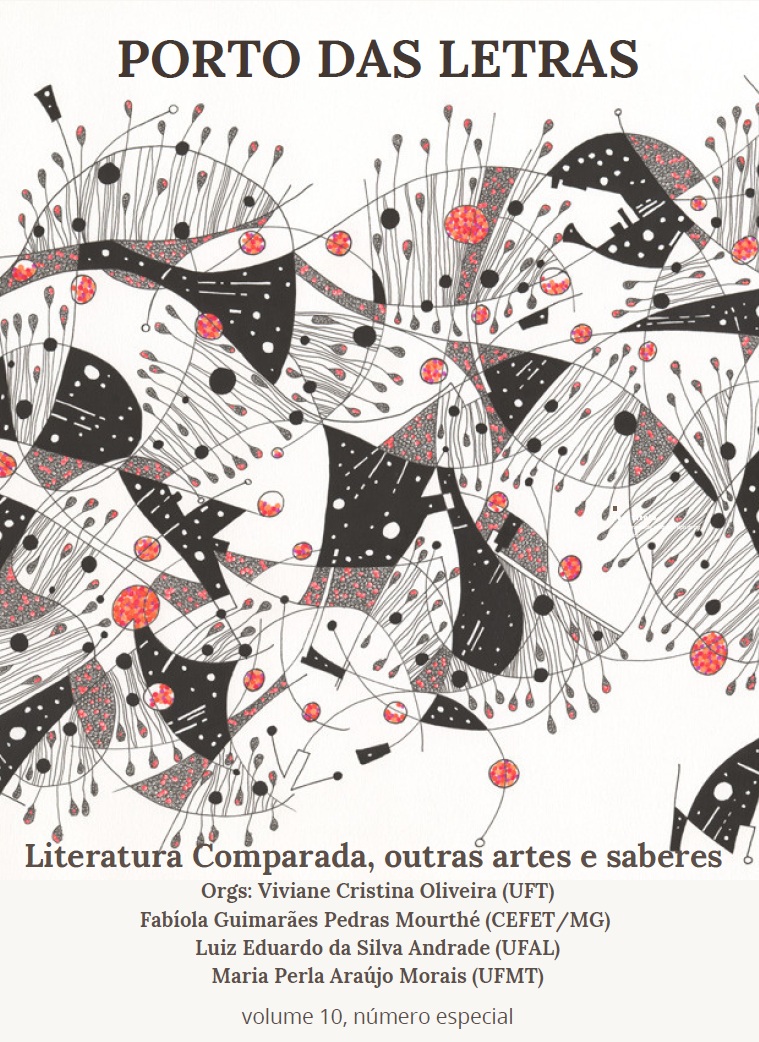O Animal Humano e o Inumano em Meia Pata de Ricardo Dantas
DOI:
https://doi.org/10.20873.24e17Resumo
A presente pesquisa dedica-se a investigar a construção da subjetividade e da alteridade a partir dos personagens Daniel e Meia Pata na interação na mata selvagem de Caracaraí – estado de Roraima – presente no romance Meia Pata (2013) de Ricardo Dantas. Para isso, toca-se no que Jacques Derrida, pensador base para esta análise, manifesta como crítica à relação estabelecida entre animal humano e animal inumano: relação de exploração violenta e dominadora. O que ocorre porque a ideia de animal no Ocidente adota o conceito cartesiano de animal como máquina, sem sentimentos e sem linguagem, possibilitando seu aniquilamento ou utilização indiscriminada de seus corpos. Todavia, na obra analisada por esse artigo, o animal onça manifesta sentimentos e raciocínio estratégico, assim como o animal humano desenvolve instinto de sobrevivência na mata, além de familiaridade com a vida selvagem. Tais acontecimentos aproximam as subjetividades e as colocam numa condição relacional, apontando para o devir sem cálculo de suas identidades.
Referências
ASSIS, Machado de. Crônicas. Obra completa – vol. III. Rio de Janeiro: Nova Aguilar, 1994, 323-775.
BLANCHOT, Maurice. O espaço literário. Rio de Janeiro: Rocco, 2011.DANTAS, Ricardo. Meia Pata. São Paulo: Editora Kazuá, 2013. 212p.
DANTAS, Ricardo. Meia Pata. São Paulo: Editora Kazuá, 2013. 212p.
DELEUZE, Gilles; GUATTARI, Felix. Mil platôs: capitalismo e esquizofrenia, vol.4. Trad. Suely Rolnik. São Paulo: Ed. 34, 1997.
DERRIDA, Jacques. A Escritura e a Diferença. Trad. Maria B. M. Nizza da Silva et al. 4. ed. São Paulo: Perspectiva, 2010.
DERRIDA, Jacques; ROUDINESCO, Elisabeth. De que amanhã. Rio de Janeiro, Jorge Zahar Ed., 2004.
DERRIDA, Jacques. Eating Well or the Calculation of the subject: an interview with Jacques Derrida. In: Eduardo Cadava (Ed.). Who Comes after the subject? Nova Iorque: Routhedge, 1991. Pgs 96-119.
DERRIDA, Jacques. Essa estranha instituição chamada literatura. Belo Horizonte: Ed. UFMG, 2014.
DERRIDA, Jacques. Força da lei: o fundamento místico da autoridade. Tradução de Fernanda Bernardo. Porto: Campo das Letras, 2003.
DERRIDA, Jacques. O Animal que Logo Sou. Trad. Fábio Landa. São Paulo: Editora UNESP, 2002.
DERRIDA, Jacques. Paixões. Trad Loris Z. Machado. Campinas: Papirus, 1995.
LOTH, Raquel Wandelli. Ver, pensar e escrever (como) um animal: devires do inumano na arte/ literatura. Tese (doutorado) Universidade Federal De Santa Catarina, 2014. 439p.
MACIEL, Maria Esther. Literatura e animalidade. Rio de Janeiro: Civilização Brasileira, 2016.
MACIEL, Maria Esther. Pensar/ escrever o animal: ensaios de zoopoética e biopolítica. Florianópolis: Editora da UFSC, 2011. p. 85-101.
MACIEL, Maria Esther. Poesia e subjetividade animal. In: PEDROSA, Célia. ALVES, Ida. (Org.). Subjetividades em devir – Estudos de poesia moderna e contemporânea. Rio de Janeiro: 7Letras, 2008, p. 219-225.
MIRANDA, Pontes de. Tratado de Direito Privado. 4ª ed. São Paulo: RT, 1983.
MITHEN, Steven. The prehistory of the mind: A search for the origins of art, religion and science. London: Thames & Hudson, 1996.
NUNES, Benedito. O animal e o primitivo: os Outros de nossa cultura. In: MACIEL, Maria Esther (Org.). Pensar/ escrever o animal: ensaios de zoopoética e biopolítica. Florianópolis: Editora da UFSC, 2011b. p. 13-22.
Downloads
Publicado
Como Citar
Edição
Seção
Licença
Os autores concordam com os termos da Declaração de Direito Autoral, que se aplicará a esta submissão caso seja publicada nesta revista (comentários ao editor podem ser incluídos a seguir).

